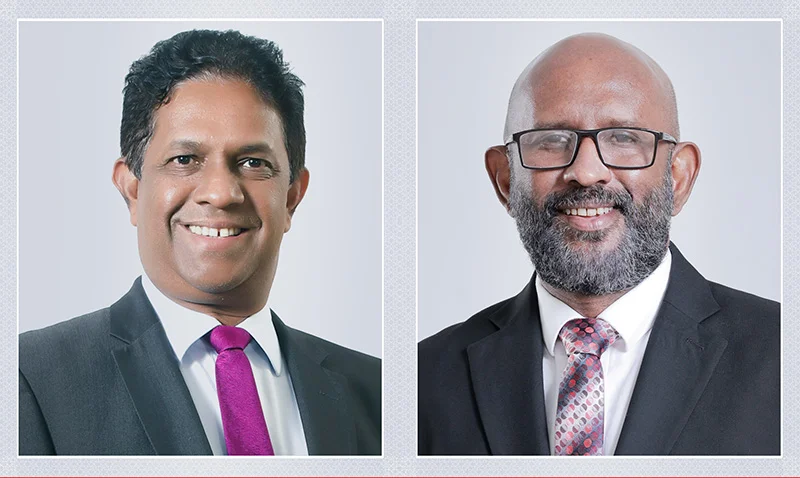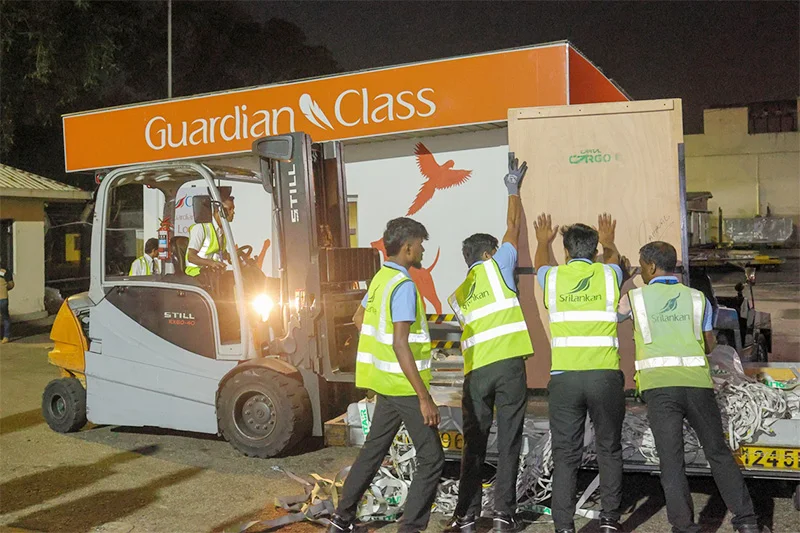Business
Index-heavy companies’ share prices down

By Hiran H.Senewiratne
CSE market activities were negative yesterday with the index heavy LOLC share prices plummeting by 18 percent. The reason being that investors were slightly taken aback at LOLC quarterly results which did not prove exceptionally good. As a result, 87 negative points were contributed to the All Share Price Index yesterday, stock market analysts said.
Apart from LOLC, several index heavy companies’ share prices went down, including Vallibal One, whose shares dropped by 10 percent and it contributed 20 negative points. Browns Investments reported a 9 percent drop and it contributed 20 negative points, Expolanka witnessed a five percent drop, contributing 17 negative points.
Amid those developments, both indices moved downwards. The All Share Price Index went down by 326.36 points and S and P SL20 declined by 126.05 points. Turnover stood at Rs. 4.28 billion with three crossings. Those crossings were reported in Sampath Bank, where 500,000 shares crossed for Rs. 82.5 million; its shares traded at Rs. 165, Sanasa Development Bank 850,000 shares crossed for Rs. 51 million, its shares traded at Rs. 60 and Hemas Holdings 350,000 shares crossed for Rs. 30.8 million, its shares trading at Rs. 58.
In the retail market top five companies that contributed to the turnover were; LOLC Rs. 730 million (1.97 million shares traded), Dipped Products Rs. 383 million (6.1 million shares traded), Expolanka Rs. 304 million (6.5 million shares traded, JKH Rs. 280 million (1.78 million shares traded) and Vallibel One Rs. 273 million (4.3 million shares traded). During the day 117.4 million share volumes changed hands in 34809 transactions.
Samapth Bank announced a dividend, which was Rs. 8.25 per share. Due to uncertain market conditions Sampath Bank shares depreciated yesterday. In contrasting actions, state fund EPF sold down in Hayleys PLC, while Sri Lanka Insurance Corporation Life Fund has upped its stake in the quarter ended December 31, 2020. Hayleys also saw 605 new shareholders in the quarter.
As per latest shareholding at Hayleys, EPF has moved down to fourth from third after selling 2.3 million shares. Its shareholding with 2.34 million shares amounted to 3.12 percent down from 5.04 percent previously. SLIC Life Fund has increased its stake to 0.79 million shares or 1.06 percent from 0.39 million shares or 0.5 percent.High net worth individual investor and former Director Nimal Perera figures in the Top 20 shareholders list with 0.5 million shares or 0.67 percent shares while J.B. Cocoshell Ltd. is also a new entrant with 0.37 million shares or 0.5 percent. Hayleys’ public shareholding is 37 percent held by 6,974 shareholders, up from 6,369 shareholders as at September 30, 2020.
Sri Lanka rupee quoted wider around 195.00/197.50 levels to the US dollar in the spot market on Tuesday, while bond yields edged up on selling pressure, dealers said. The rupee last closed in on the one-week forward market at 196.50/197.00 levels on Monday. In the secondary market, bond yields gained on selling pressure but the market remained dull, dealers said.
Business
Pan Asia Bank’s overall assets soar over Rs. 300 Bn and achieve a PAT of Rs.4 Bn

Pan Asia Banking Corporation PLC reported a strong financial performance for 2025, marking a year in which the Bank reinforced its position among Sri Lanka’s steadily expanding financial institutions. The Bank’s overall asset base surpassed Rs. 300 Bn, reaching Rs. 308.02 Bn its largest balance sheet to date while Profit After Tax amounted to Rs. 4.01 Bn. Earnings Per Share stood at Rs. 9.05, reflecting a solid core earnings base and disciplined balancesheet execution during a year of gradually easing macroeconomic pressures.
Total operating income grew to Rs. 16 Bn, supported by resilient net interest generation and sharp growth in non-interest revenue. Even though benchmark interest rates trended downward for much of the year reducing gross interest income at the market level, the Bank protected its core income through proactive liability repricing, careful funding management, and the retirement of high-cost borrowings. A healthier deposit mix supported by CASA growth helped reduce interest expenses by 4%, allowing the Bank to maintain profitability despite softer yields on loans and government securities.
A clearer picture of Pan Asia Bank’s true performance emerges once the nonrecurring sovereign debt gain recorded in 2024 is set aside. On this normalized basis, 2025 stands out as the Bank’s strongest year of underlying profitability in its 30-year history. Underlying Profit After Tax surged 35% to Rs. 4.01 Bn, while underlying Profit Before Tax climbed an impressive 52%, highlighting the Bank’s accelerating earnings momentum. Underlying EPS rose 35% to Rs. 9.05, supported by improved returns, with underlying ROE and ROA rising by 169 and 52 basis points, respectively. Together, these gains reflect the depth of the Bank’s core business strengths, broadbased revenue growth, and disciplined margin management during a year shaped by declining interestrate conditions.
Income diversification also played a pivotal role. Net fee and commission income expanded by 37%, supported by heightened lending activity, improved trade flows, stronger card-related transactions, and remarkable growth in remittance-related business. These developments helped offset the moderation in trading gains, which were affected by lower capital gains on unit trusts and government securities. A derecognition gain of Rs. 278.63 million on FVOCI assets and reduced marktomarket losses helped stabilize noninterest income, allowing the Bank to sustain earnings despite a more subdued trading environment.
Credit quality improved significantly. The Stage 3 loan ratio declined to 1.73% from 3.10% a year earlier one of the greatest improvements within the sector—reflecting the Bank’s continued emphasis on highquality underwriting, better borrower monitoring, and an effective earlywarning framework. Impairment expenses normalized following the unusually large reversal seen in 2024. ( Pan Asia Bank)
Business
SriLankan Cargo secures another South Asian First with IATA CEIV Live Animals Certification

SriLankan Cargo, the air freight arm of SriLankan Airlines, has secured another regional first by becoming the first airline in South Asia to be awarded the Center of Excellence for Independent Validators (CEIV) for Live Animals Logistics Certification from the International Air Transport Association (IATA). Regarded as the premium global standard for the air transport of live animals, the certification serves as a powerful pledge to pet parents, livestock owners, conservationists and all shippers that SriLankan Cargo will transport animals in humane, safe and stress-free conditions across its worldwide network.
Chaminda Perera, Head of Cargo at SriLankan Airlines, commented on the achievement, stating, “Earning the IATA CEIV Live Animals Certification underscores our dedication to animal welfare and operational excellence, ensuring safer handling, trained teams and peace of mind for our customers.”
Sheldon Hee, Regional Vice President, Asia-Pacific, said, “The CEIV Live Animals certification is not only about compliance, but ensures the safety and welfare of live animals transported by air. This is particularly relevant as this is a market that continues to grow with more than 200,000 live animal shipments globally in 2025. We are pleased to see SriLankan Airlines achieve this important certification and ensure the implementation of the highest standards across the supply chain.”
The certification stands out for placing animal safety and welfare at the forefront, supported by best-in-class infrastructure and operational excellence. Achieving it requires a rigorous, multi-step process of training, assessment, validation, certification and recertification, ensuring that only organisations fully compliant with the IATA Live Animals Regulations and the Convention on International Trade in Endangered Species gain membership in this highly exclusive circle of airlines, which currently numbers 12 worldwide.
SriLankan Cargo remains firmly committed to upholding the highest standards stipulated in the IATA Live Animals Regulations throughout the shipment lifecycle, from acceptance and handling to loading, transportation and final delivery. Working closely with veterinary authorities, ground handlers and cargo partners, the airline ensures every check box relating to welfare and compliance is consistently ticked.
SriLankan Cargo also operates purpose-built facilities with precise temperature control procedures and robust contingency plans, enabling animals to travel in optimal conditions, including during transit. Dedicated CEIV-trained team members oversee each movement, safeguarding comfort, wellbeing and regulatory adherence at every stage.
Business
Prime Lands Residencies reports strong earnings growth

Prime Lands Residencies PLC (CSE: PLR) reported strong financial performance for the quarter ended 31 December 2025, keeping shareholder expectations intact.
The company’s share price increased by more than 40% over the last three months, reflecting heightened investor confidence. Market expectations remained elevated given the scale of project launches over the past two years, including three towers in The Border Colombo (484 units), J’adore Negombo (333 units), The Golf Colombo 08 (64 units), Mon Vie Colombo 05 (349 units), Prime Colombo 9 (559 units), and The Seasons Colombo 08 (44 units).
Quarterly revenue grew by 43% year-on-year to Rs. 2.80 billion, compared to the corresponding period last year. This growth was primarily driven by accelerated construction progress in Towers C of The Border Colombo project, together with first time revenue recognition from The Seasons Colombo 08. Revenue from the newly launched remaining projects is yet to be recognized in line with construction milestones and the company’s prudent revenue recognition policy, establishing the growth potential in earnings in upcoming periods.
-

 Life style4 days ago
Life style4 days agoMarriot new GM Suranga
-

 Business3 days ago
Business3 days agoMinistry of Brands to launch Sri Lanka’s first off-price retail destination
-

 Features4 days ago
Features4 days agoMonks’ march, in America and Sri Lanka
-

 Opinion7 days ago
Opinion7 days agoWill computers ever be intelligent?
-

 Features4 days ago
Features4 days agoThe Rise of Takaichi
-

 Features4 days ago
Features4 days agoWetlands of Sri Lanka:
-

 News4 days ago
News4 days agoThailand to recruit 10,000 Lankans under new labour pact
-

 News4 days ago
News4 days agoMassive Sangha confab to address alleged injustices against monks













